Iran says it’s ready to retaliate but not seeking war with Israel
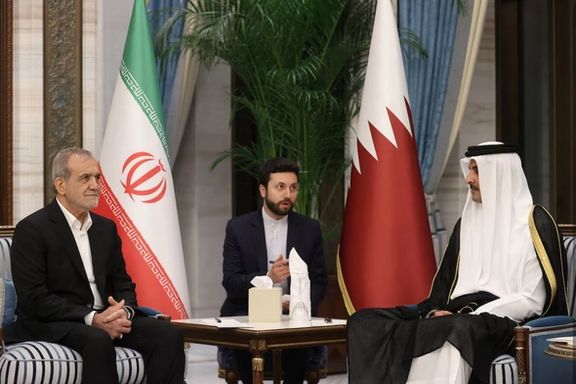
Iranian President Masoud Pezeshkian warned that Tehran would deliver a strong response to any further Israeli actions, however he mentioned that Tehran is not seeking war with Israel.

Iranian President Masoud Pezeshkian warned that Tehran would deliver a strong response to any further Israeli actions, however he mentioned that Tehran is not seeking war with Israel.
“We are not in pursuit of war with Israel. They promised us peace. But Israel has terrorised our guests in Tehran during our presidential inauguration. We want to establish peace. If you disagree, peace will not be established,” he said on Thursday during his trip to Qatar.
Pezeshkian’s trip came a day after Iran launched waves of ballistic missiles at Israel, prompting tensions between the two arch enemies. In response, Israel escalated its ongoing conflict with Tehran’s ally Hezbollah by sending more troops across the border into Lebanon. Israeli Prime Minister Benjamin Netanyahu stated that Israel would retaliate against Iran following the missile strikes.
"If the Zionist regime does not stop its crimes, it will face harsher reactions," Pezeshkian stated before leaving Tehran, according to Iranian state media. He reiterated his position during a joint press conference in Doha with Qatar's Emir Sheikh Tamim bin Hamad al-Thani, emphasizing that if Israel acts against Iran, Tehran will respond more severely.
Qatar, which does not have diplomatic relations with Israel, has been one of the mediators between Israel and Iran-backed Hamas. Israel has accused Qatar of being too soft with Hamas which has one of its political offices in Doha.
Pezeshkian also addressed the recent assassination of Hamas leader Ismail Haniyeh on July 31 in Tehran, which Iran blames on Israel, though Israel has not officially confirmed its involvement.
The Iranian president called on the United States and European countries to pressure Israel to avoid further “destabilizing” the region, without taking responsibility for Tehran's proxies being active across all Israel's borders. Since Hamas's invasion of Israel on October 7, Iran's militias in Yemen, Syria, Iraq and Lebanon have launched attacks on the Jewish state in allegiance with Hamas in Gaza.
The Qatari Emir, Sheikh Tamim, reiterated Doha’s commitment to mediating peace efforts, particularly in the ongoing conflict between Israel and Hamas in Gaza, which has been ongoing for nearly a year. Efforts to reach a ceasefire have so far stalled.
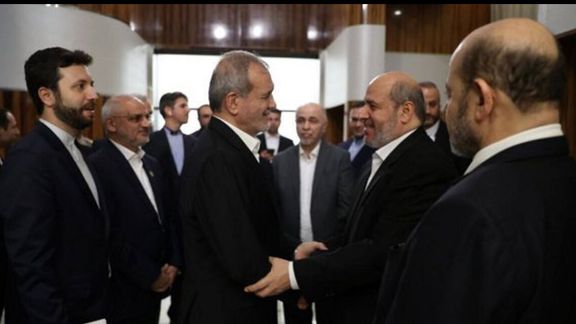
While in Qatar, Pezeshkian also met with a high-ranking delegation from Hamas and Saudi Foreign Minister Faisal bin Farhan. During his talks with the Saudi official, Pezeshkian expressed satisfaction with what he described as expanding relations between Iran and Saudi Arabia and highlighted Iran's interest in strengthening ties across the region, in spite of the limited progress between Iran and Saudi since last year's resumption of diplomatic relations.
The Iranian president will continue his visit by attending the Asia Cooperation Dialogue (ACD) Summit in Doha, where he is expected to seek broader regional support against Israel. He is scheduled to address the summit, which includes 35 Asian countries.

Following the recent escalation between Iran and Israel, a hardline Tehran newspaper is calling for a significant shift in the Islamic Republic’s nuclear doctrine, advocating for a major “transformation.”
On October 1, Iran launched a large-scale ballistic missile attack on Israel, citing the need to defend its national interests following Israeli strikes against its primary military proxy, Hezbollah, in Lebanon. In response, Israel has vowed a forceful retaliation.
As Iran braces for Israeli retaliation, the Javan newspaper, representing the Islamic Republic’s ultra-hardliners, argued on Thursday that it is time for Iran to revise its nuclear doctrine, which has long claimed the country is solely focused on peaceful objectives.
In a note written by Ali Ghannadi, Javan emphasized that "while Iran's nuclear doctrine over the past fifty-plus years (including the Pahlavi era) has been focused on the peaceful use of nuclear energy, today Tehran has the capacity, context, and opportunity for an immediate transformation in this program."
The note argued that conventional attacks on Israel fail to provide adequate deterrence, "given the resolve of Israeli leaders to use devastating military technology to establish a new order. This approach risks escalating the conflict even further. While some may propose creative solutions to manage the situation, one immediate option is a shift in Iran's nuclear doctrine."
The article noted that if the escalating confrontation and mutual attacks lead to a point when Israel faces and existential threat, would its government issue a nuclear threat against Iran? “Is the possibility of Israel issuing a clear or secret nuclear ultimatum out of the question?"
The hardliner newspaper went on to argue that Iran needs a deterrence against Israel’s overwhelming technological advantage, hinting at what could be interpreted as mutual nuclear deterrence.
Supreme Leader Ali Khamenei is expected to deliver a sermon during Friday prayers in Tehran on October 4, with speculation that he may unveil a new nuclear doctrine following the severe damage to Hezbollah, Iran’s key proxy force. Currently, Iran is amassing a stockpile of uranium enriched to 60%, which could be refined to 90%—the level needed for a nuclear bomb—in just two weeks. A shift in Iran's nuclear doctrine could signal an open move to enrich uranium to 90%, threatening the development of a nuclear weapon if Israel targets its vital interests.
Nearly a dozen nuclear sites in Iran are potential targets in an Israeli attack aiming to destroy or cripple Tehran atomic program, specifically its enrichment centers in places like Natanz.
Former Israeli Prime Minister Naftali Bennett called Tuesday for the destruction of Iran’s nuclear program following the Iranian missile attack.
“Israel has now its greatest opportunity in 50 years, to change the face of the Middle East,” Bennett said on his X account.
“We must act ‘now’ to destroy Iran’s nuclear program, its central energy facilities, and to fatally cripple this terrorist regime.”
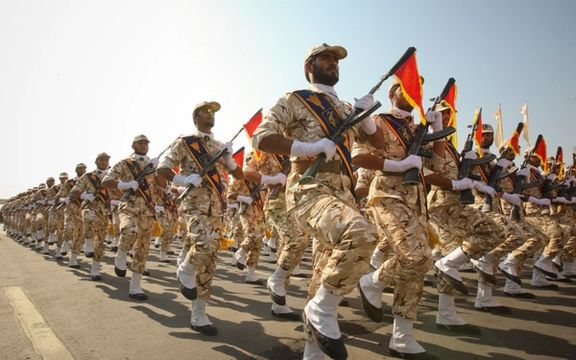
Before Iran launched a massive missile attack against Israel, the Quds Force—the arm of the Iranian military responsible for conducting proxy warfare—reasserted its primary mission: the elimination of Israel.
Yadollah Javani, a high-ranking military figure and political deputy of the IRGC, explicitly announced this mission for the first time during a political meeting with IRGC personnel in Iran's northwestern Qazvin province, as reported by Javan Online, a publication closely aligned with the IRGC.
Tehran launched over 100 ballistic missiles against Israel on Tuesday night, stating the attack was in retaliation for the killing of Hezbollah leader Hassan Nasrallah and senior IRGC commander Abbas Nilforoushan, both of whom were killed in recent Israeli strikes.
Javani’s comments, made just before Iran’s missile strikes, reflect a shift. Traditionally, the Quds Force has relied on indirect tactics against Israel, utilizing asymmetrical warfare and proxy forces. Now, Iran appears to be moving toward more direct confrontation, signaling a bold escalation in its approach.
The IRGC official emphasized the importance of this policy, asserting that the elimination of Israel is a longstanding commitment of Iran's Islamic government – with the Quds Force having been created by the Supreme Leader in pursuit of that goal.
"The policy of the Islamic Republic is the eradication of the existence of the Zionist regime. The Leader of the Revolution and the Islamic Revolutionary Guard Corps (IRGC) consider this a commitment. The Leader, in continuation of Imam Khomeini (may his soul rest in peace), has followed this policy, creating a force called the Quds Force, whose mission is clear,” Javani said.
“The Islamic Revolution and the new Islamic civilization have the elimination of Israel on their agenda," Javani added.
Iran’s Supreme Leader Ali Khamenei, who had previously vowed that Israel's killing of Hezbollah leader Hassan Nasrallah "will not go unavenged," was reportedly moved to a secret location in late September, according to Reuters. Tehran had previously refrained from retaliating for the widely perceived humiliating assassination of Hamas political leader Ismail Haniyeh in a Tehran guesthouse in July.
According to officials who spoke with The New York Times, conservatives in the Islamic Republic’s establishment were pushing for direct retaliation, while the so-called moderates reportedly preferred to avoid an all-out war.
On Sunday, Iranian Foreign Minister Abbas Araghchi had condemned the killing of IRGC deputy commander Abbas Nilforoushan in Beirut by Israel, calling it a "horrible crime" that would not go unanswered.
This week, the reformist news site Etemad Online featured an interview with an Iranian foreign policy analyst, Reza Nasri, who argued primarily against direct military confrontation with Israel, stating that such actions have historically strengthened Israel through US and international support. Instead, Nasri advocated for a "death by a thousand cuts" strategy: a prolonged effort to weaken Israel through economic, political, and demographic pressures. Nasri had further suggested focusing on creating internal instability in Israel, halting immigration, and damaging Israel's global reputation.
After the killing of Nasrallah, Nasri posted a tweet on his X page comparing the Hezbollah leader—widely known for his involvement in violent militant activities—to Nelson Mandela, a global icon of non-violence and reconciliation.
Iranian officials, including political and military figure Hossein Kanani Moghadam, who is affiliated with the IRGC, had emphasized that any decision to escalate or engage in open conflict is ultimately made by the Supreme Leader.
Speaking to centrist media Fararu, Moghadam had pointed out that Hezbollah has entered an "open-ended war" scenario, where there are no red lines for future operations against Israel, indicating that all forms of retaliation were on the table.
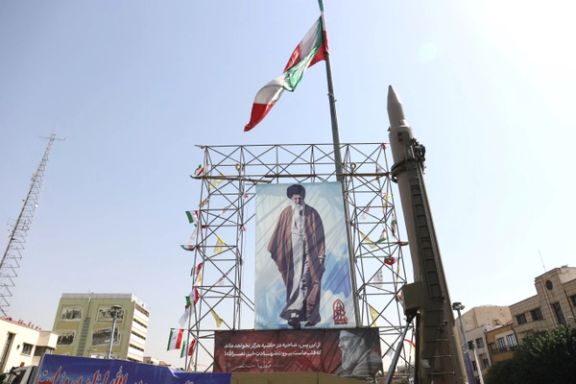
In the wake of Iran's massive but largely ineffectual missile barrage, Israel has arrived at a critical crossroads that will test its ambition in dealing with its mortal enemy.
All options carry grave consequences for the balance of power in the region and Israel's standing in an increasingly intense conflict flaring on multiple fronts.
Israel could heed US and international pleas for calm by downplaying the attack - just as it did when Iran launched its last missile volley in April - and hold off on a major response.
It might decide to target Iran’s political and military leadership, killing key figures as it has with Iran-backed Hezbollah in Lebanon.
In an even more extreme scenario, the Jewish state could take aim at Iran’s nuclear facilities, vital military sites, and economic infrastructure such as oil fields and refineries.
Still more devastating would be a combination of the last two options: an all-out strategy in which assassinations are paired with widespread destruction of military and economic infrastructure.
No perfect option
The first option is highly unlikely.
With the stakes so high, ignoring the attack may be seen from Israel as emboldening Iran and sending a message of weakness to its regional allies just as Israel appears to be gaining a military advantage, particularly in Lebanon.
The assassination route, while projecting unabashed strength, would not have a game-changing impact on the ground: Iran would quickly fill any personnel gaps with even more hardline cadres with redoubled hatred towards Israel.
The most extreme options also carry the most risks. Targeting Iran’s nuclear sites and infrastructure would almost certainly escalate into a full-scale war and drag the United States into the conflict - something both presidential hopefuls are on record as seeking to avoid.
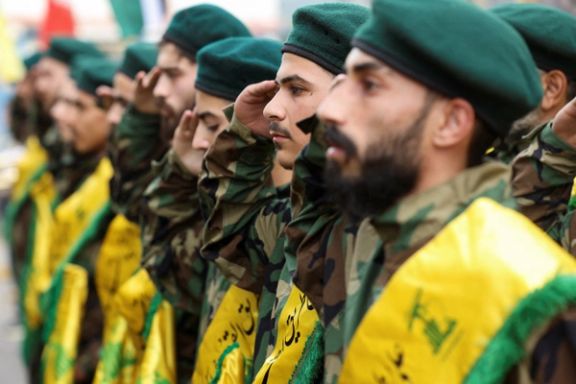
The Hezbollah Factor
Iran has always been hopeful that if it faced a confrontation with Israel or the US, Hezbollah’s presence in Israel’s neighborhood would make them think twice.
But Iran’s deterrent force in Lebanon has now been significantly weakened by Israeli bombings and airstrikes. Israel systematically targeted and decimated Hezbollah’s leadership within two weeks, and its missile arsenal could be degraded next.
A hobbled Hezbollah would mean the end of Iran’s most effective deterrent force in the region. But might that lead Iran to pivot toward building a new deterrent? And what might this deterrent be other than a nuclear weapon?
This would be an enormous strategic setback for Israel and accelerate the very nightmare scenario it seeks to prevent.
One shot
For Israel, this moment presents a rare opportunity to deal a severe blow to Iran’s nuclear ambitions, one that it would be reluctant to pass up.
But the bigger question remains: Will President Joe Biden support Israel’s more aggressive actions, even if it means risking a new war in the Middle East?
The answer is far from simple. If the Biden administration doesn’t back Israel, the Democratic Party could appear feckless and weak, which may not help at polls. But if it chooses to support a military strike that cripples Iran, it could alienate the left wing of his party, potentially losing some progressive votes.
Such a move might also appeal to moderate Republicans who oppose Donald Trump, creating an unexpected coalition of support. Standing with Israel could also help guarantee the backing of the influential pro-Israel lobby in Washington.

Can Israel Truly Stop Iran's Nuclear Program?
Some experts believe that Iran’s nuclear program is too deeply entrenched underground for Israeli airstrikes to eliminate it entirely. While it’s true that Israel may not be able to completely destroy the program, a well-executed attack might delay it by a few years.
Furthermore, if Israel opts for a combined assault - targeting both Iran’s nuclear facilities and its leadership - it could wound the Islamic Republic to the point where it may no longer be able to rebuild its nuclear program. In this scenario, the collapse of the whole ruling system could become a real possibility.
Israel's response to Iran’s missile attacks will not only determine the future of the Middle East but also have profound implications for the US's role in the world.
The Biden administration will weigh its options carefully. A misstep could ignite a regional conflict with global consequences, but doing nothing might risk emboldening Iran and rattling the security of the region even more.
Iran’s Fragile State
For the Islamic Republic of Iran, the current situation is precarious. Supreme Leader Ayatollah Khamenei is 85 - and in declining health.
The theocratic 'system' narrowly survived a major uprising just two years ago, and the country's economic conditions have worsened significantly.
Millions of Iranians are grappling with severe economic hardship, while tens of thousands of government workers have protested in the streets over delayed salaries and unpaid wages.
Unemployment remains high, and less than three months ago, Iran held a presidential election that saw a record-low voter turnout, ushering in a president with an unprecedentedly weak mandate.
In this fragile state, and after suffering significant blows from Israel - including the assassination of Ismail Haniyeh in Tehran on the day of the new president’s inauguration - Iran finds itself much weakened.
The question now is: can the Ayatollahs contain the growing discontent within the country if it is drawn into a war?
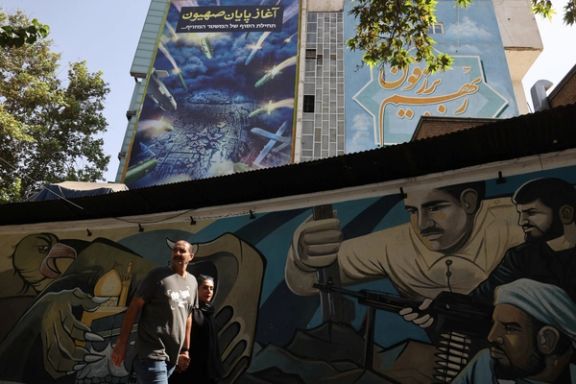
Iranian netizens are expressing highly contradictory opinions about Tuesday’s missile attack on Israel, ranging from strong approval to calls for Israel to retaliate forcefully.
Posts from Iranian hardliners and ultra-hardliners expressed both enthusiasm for the missile strike and frustration with President Masoud Pezeshkian. This group, which typically supports Saeed Jalili, an ultra-conservative politician and former nuclear negotiator, criticized Pezeshkian and his Strategic Deputy, Mohammad-Javad Zarif, for delaying a response to Israel after the assassination of Hamas leader Ismail Haniyeh in Tehran in July. They argued that the government’s retaliation came too late, further deepening their dissatisfaction with Pezeshkian's leadership.
“Yes, you are right, war is scary but sometimes there’s no other option. War is like chemotherapy which has pain, costs, side effects and may even not work but it is sometimes the only and final path,” a pro-Jalili netizen posted.
“Patience and delay in revenge for Haniyeh did not stop the brutal killing. Fear of war causes war [because] it rouses the enemy’s greed,” another ultra-hardliner tweeted.
“Understand this you idiots: war can only be prevented with firing missiles. Showing fear and weakness is the biggest contributor to the start of a war,” a post by a similarly-minded netizen who used the hashtag #وعده_صادق٢ (Operation True Promise 2) read.
Some ordinary Iranians, who don't seem to support the establishment but may have backed Pezeshkian's presidency in hopes that he could improve their lives, are now expressing fears about the situation escalating into a full-scale war between the Islamic Republic and Israel.
“Israel has yet not responded to last night’s attack. We, the people, live in the shadow of fear, anxiety, and trepidation. We are worried about our children. Queues have formed for gasoline and we are waiting to see what is going to happen,” a netizen who has blamed the Islamic Republic for “starting the war” in her other tweets posted on X.
“The people of the future should know that the reason for the war was the Islamic Republic’s interference and full support for Palestine when other Islamic and Arab countries had withdrawn and were in complete silence,” she wrote in another tweet with the hashtag #نه_به_جنگ ("No to war").
Many who advocate for the overthrow of the Islamic Republic, identifying as barandaz (those who seek regime change), are blaming Supreme Leader Ali Khamenei and his loyalists for actions that they believe could push the country into a devastating war.
Some within the barandaz group, who support the return of monarchy to Iran and view Israel as an ally of the Iranian people, are actively urging Israeli Prime Minister Benjamin Netanyahu to strike the Islamic Republic and its leaders.
They argue a massive strike is even more warranted, and justified, in retaliation for Iran's second attack on Israel Tuesday with ballistic missiles.
“They are enemies of humanity. Strike the houses of IRGC generals and top officials of the regime, IRGC bases, seminaries, and mosques. We are ready to pay that price for the weakening of the regime and its annihilation too if you are forced to strike infrastructures,” a barandaz tweeted with the hashtag #اسرائیل_بزن (Israel strike [the Islamic Republic]).
“Beware of the Islamic Republic’s self-inflicted harms to defame Israel and to earn international attention and pity. Avoid going to religious events and crowded public venues. Be careful not to fall victim to Khamenei’s ambition and madness,” a dissident netizen tweeted with the same hashtag.
Other netizens on X who share similar views have suggested that Israel target nuclear sites, refineries, the parliament, the president’s office, and Supreme Leader Ali Khamenei’s residence.
However, there is also criticism of the barandaz who encourage Israeli attacks, with opponents arguing that such actions would cause widespread suffering and devastation for all Iranians, regardless of their political beliefs.
“My friends who think that Iranian people and the regime are separate, my dears, your food on the table will be less and your home will be destroyed if Israel strikes infrastructures. Israel will not give you a dollar even if the regime collapses. Look at the situation in Iraq and Afghanistan and stop posting [Instagram] stories and tweets [to tell] Israel to strike Iran…,” a Finland-based Iranian who appears unsympathetic to the establishment in his tweets posted on X.
“I feel sorry about those who are happy with the beginning of the war, whether they are supporters of the regime or its opponents. You haven’t seen war at close and don’t know what war means, I only know about the damages and consequences of war from what I’ve observed in friends and acquaintances, too … Remember that bombs and missiles don’t have eyes. Living and dead trees both burn when there’s a fire in the forest,” another opponent of war who appears to be living in Iran tweeted.
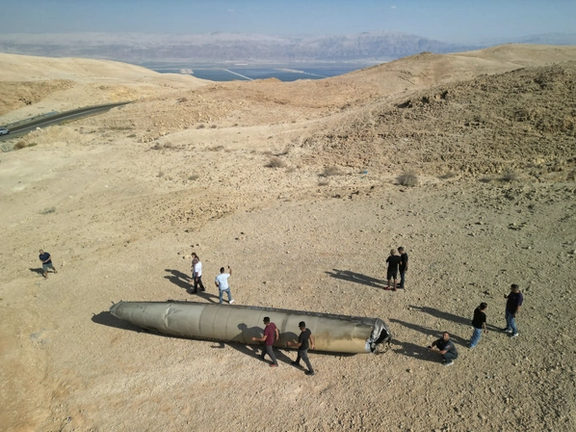
US President Joe Biden on Wednesday said Israel should not strike Iranian nuclear sites in a retaliation for a missile attack the previous day, saying a response must be proportional.
Asked by reporters if the Jewish state should hit at the disputed nuclear program after Iran's greatest-ever attack on its soil, Biden said, "no".
An international consensus among world powers in the G7 group was that retaliation was warranted but should be limited, he added.
“All seven of us agree that they have a right to respond, but they have to respond proportionally."
Iran launched around 180 missiles at Israel on Wednesday, the Israeli military said. The attack was largely repulsed with US and Western help but several missiles hit their mark, including an Israeli air base.
Israel's ambassador to the United Nations Danny Danon told an emergency Security Council meeting on Wednesday that an Israeli riposte was inevitable.
"Let me be clear, Israel will defend itself. We will act," he said. "And let me assure you, the consequences Iran will face for their actions will be far greater than they could ever have imagined."
Iran's Islamic Revolution Guard Corps said the attack was in response to the killing of Hamas leader Ismail Haniyeh and Hezbollah chief Hassan Nasrallah, warning Israel that it will strike again if there was an Israeli response.
Israel was aided in fending off a previous one-off missile fusillade from Iran in April by the United States, Western and Arab partners, after which Washington urged Israel to hold off on a counterattack.
But the US government is not trying to dissuade Israel from hitting back this time, CNN said citing two senior US officials.
"No one’s saying don’t respond. No one’s saying ‘take the win'," one source said, referring to Washington's argument to Israel in April.
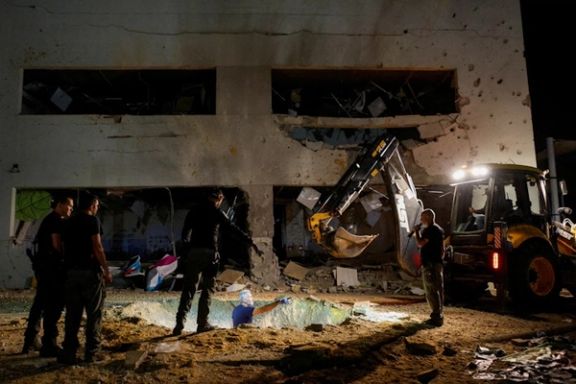
War or Peace
Iran's president Masoud Pezeshkian accused Israel of forcing his country to react, saying that Tehran “is not looking for war but looking forward to peace”.
"We were asked to maintain calm. For the sake of peace, we have maintained self-restraint,” he said at a joint press conference with the Emir of Qatar in Doha. “If [Israel] acts, we will react more fiercely and harshly."
Israel declared Secretary-General Antonio Guterres persona non grata for what it said was insufficient rejection of Iran's attack.
Speaking at the Security Council later in the day, Guterres condemned the Iranian barrage on Israel the previous day, adding that the “deadly cycle of tit-for-tat violence must stop.”
“Time is running out,” he warned.
Meanwhile Israel announced the deaths in combat of eight Israeli soldiers in Lebanon, days after it launched an invasion of the country it said aimed at stopping rocket fire on its border communities by Iran-backed Hezbollah fighters.
Israel has landed devastating blows against Hezbollah, killing its leader Hassan Nasrallah in an aerial bombardment on Beirut on Friday along with much of its top leadership.
The attacks have killed up to a 1,000 people including many civilians while displacing nearly a million people.
A top Hamas leader Ismail Haniyeh was killed in an explosion Tehran in July in an assassination widely blamed on Israel, raising Iran's ire but not immediately drawing any response at that time.